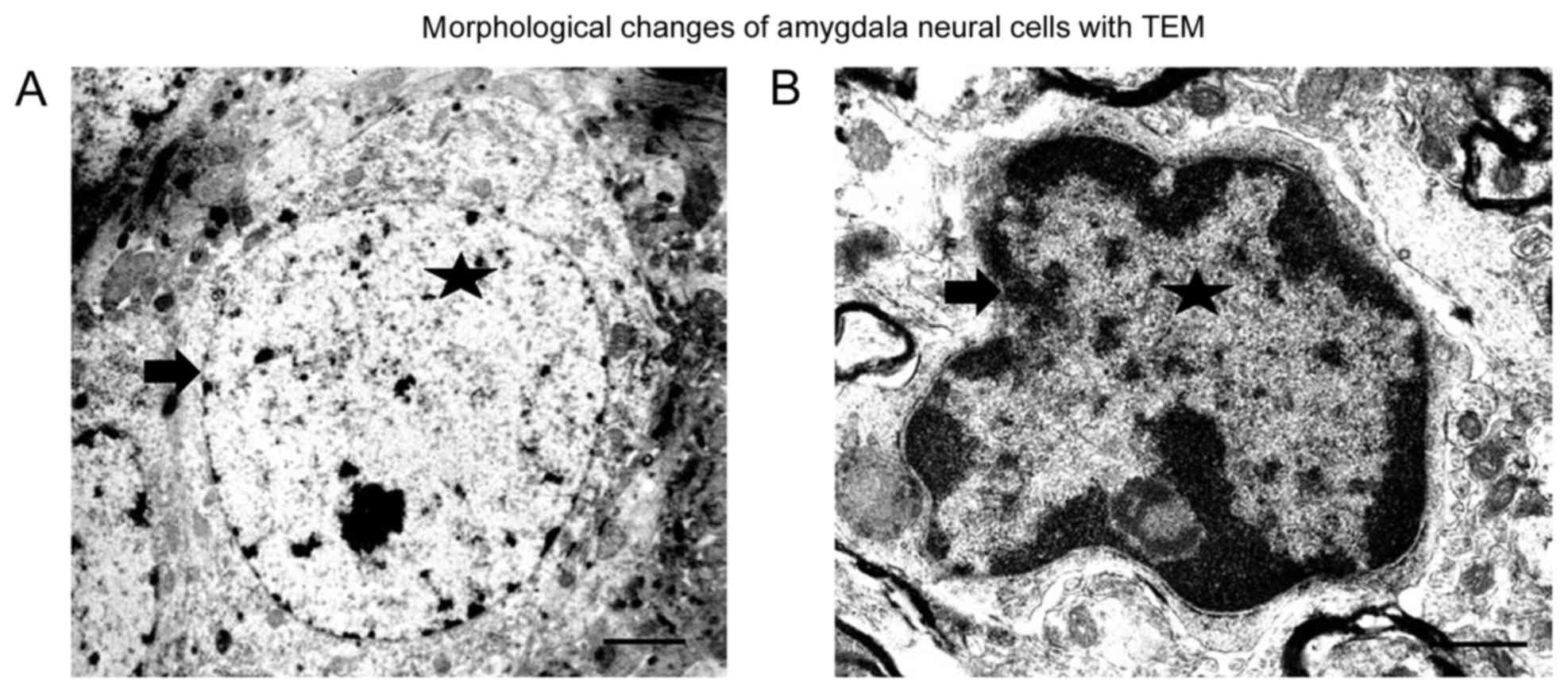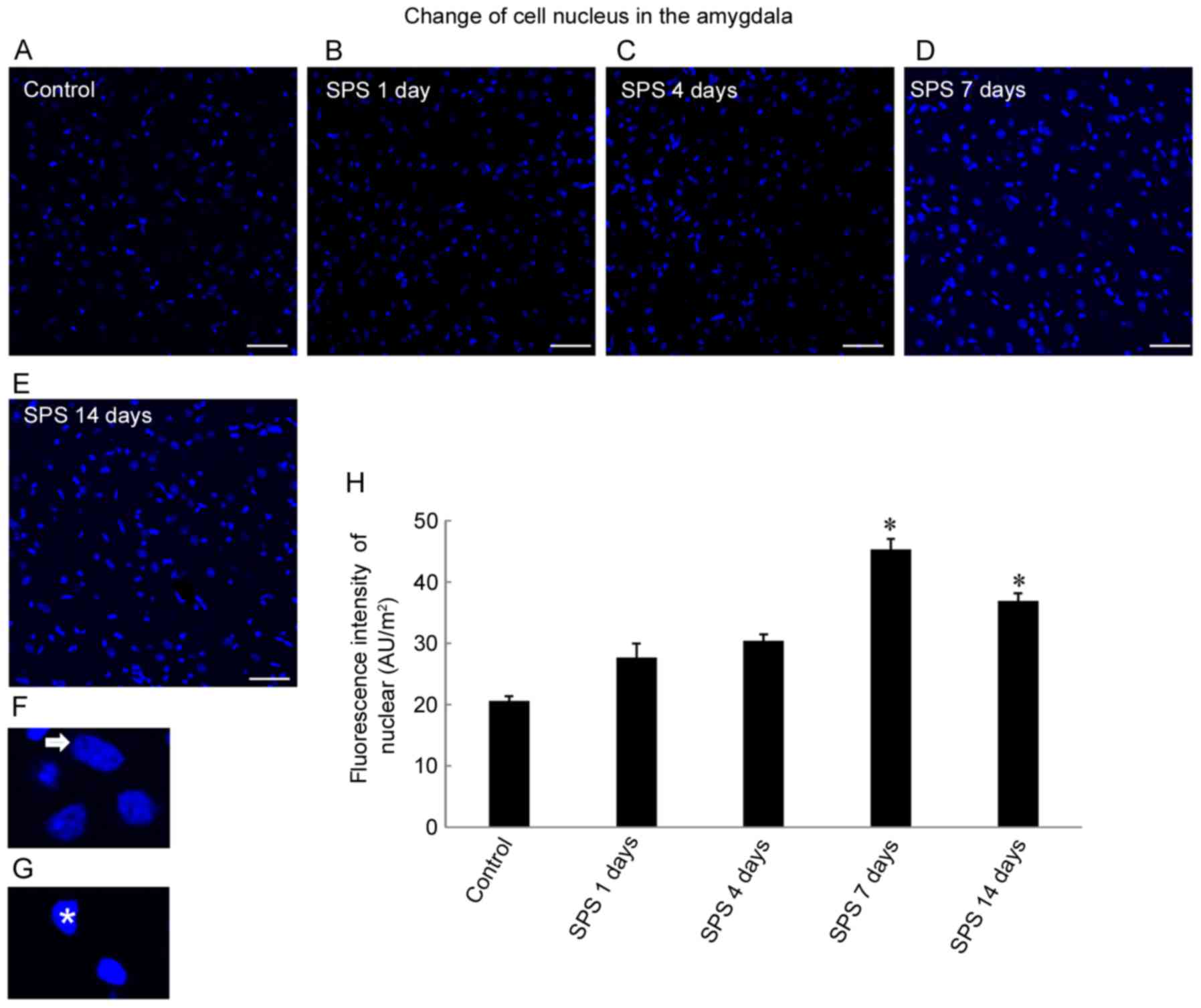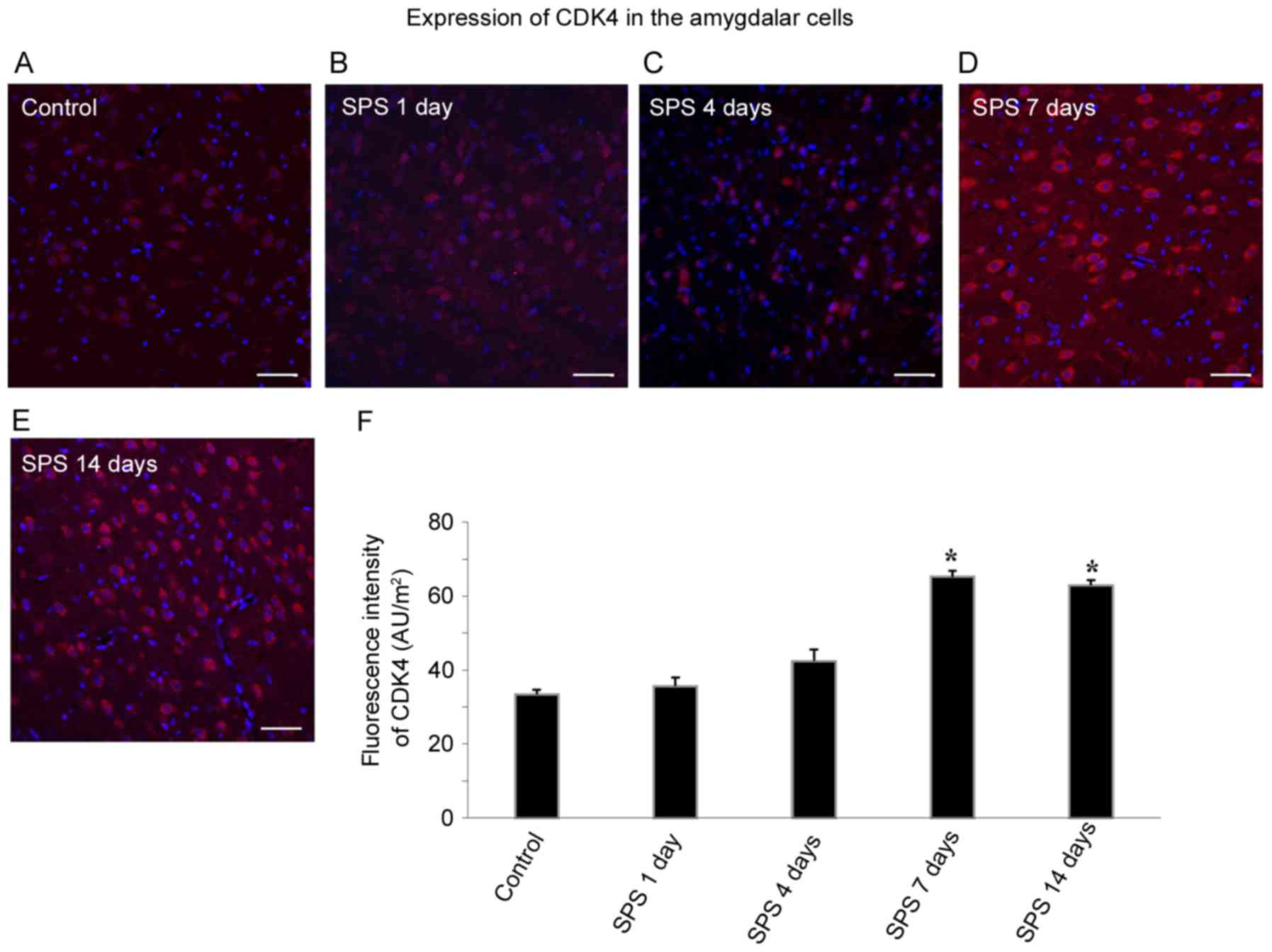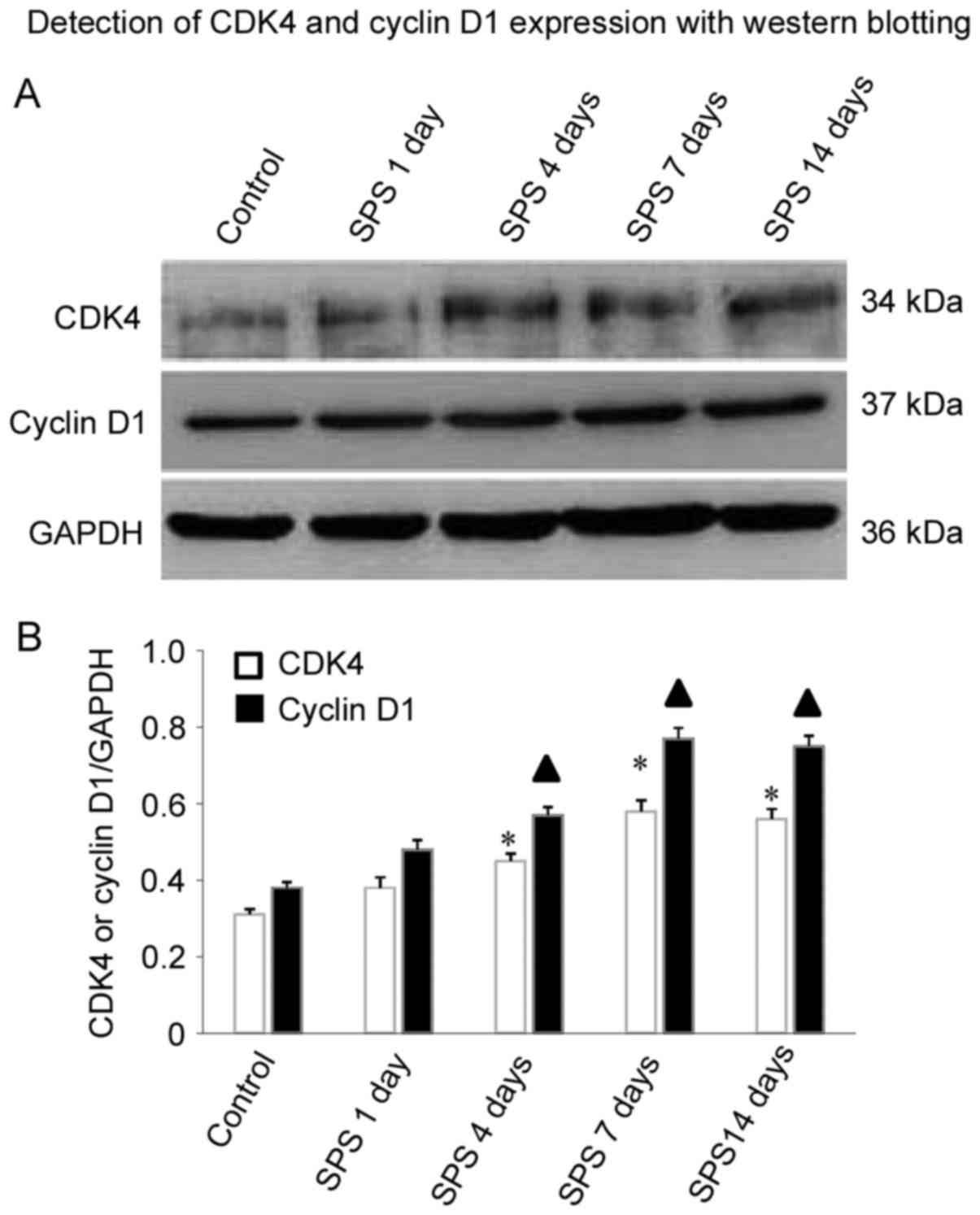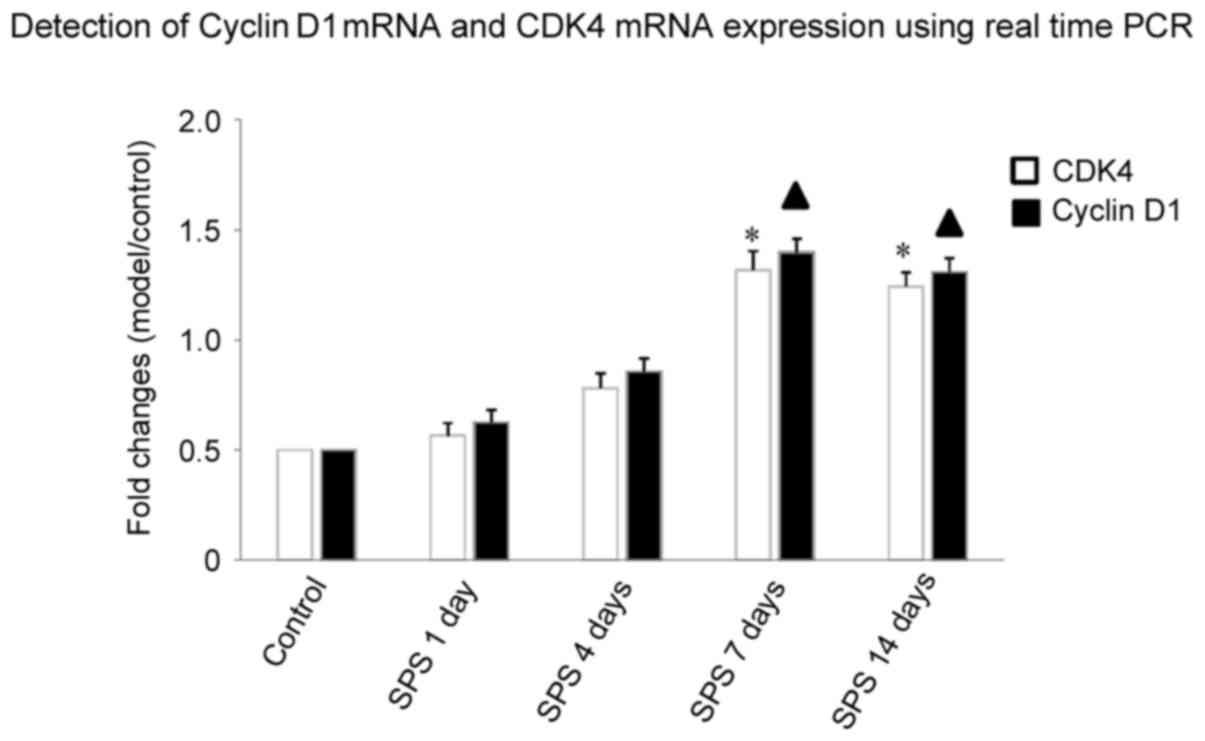|
1
|
Bremner JD: The relationship between
cognitive and brain changes in posttraumatic stress disorder. Ann N
Y Acad Sci. 1071:80–86. 2006. View Article : Google Scholar : PubMed/NCBI
|
|
2
|
Francati V, Vermetten E and Bremner JD:
Functional neuroimaging studies in posttraumatic stress disorder:
Review of current methods and findings. Depress Anxiety.
24:202–218. 2007. View
Article : Google Scholar : PubMed/NCBI
|
|
3
|
Brown VM, LaBar KS, Haswell CC, Gold AL;
Mid-Atlantic MIRECC Workgroup, ; McCarthy G and Morey RA: Altered
resting-state functional connectivity of basolateral and
centromedial amygdala complexes in posttraumatic stress disorder.
Neuropsychopharmacology. 39:351–359. 2014. View Article : Google Scholar : PubMed/NCBI
|
|
4
|
Bahraini NH, Breshears RE, Hernández TD,
Schneider AL, Forster JE and Brenner LA: Traumatic brain injury and
posttraumatic stress disorder. Psychiatr Clin North Am. 37:55–75.
2014. View Article : Google Scholar : PubMed/NCBI
|
|
5
|
Klumpers F, Morgan B, Terburg D, Stein DJ
and van Honk J: Impaired acquisition of classically conditioned
fear-potentiated startle reflexes in humans with focal bilateral
basolateral amygdala damage. Soc Cogn Affect Neurosci.
10:1161–1168. 2015. View Article : Google Scholar : PubMed/NCBI
|
|
6
|
Harding AJ, Stimson E, Henderson JM and
Halliday GM: Clinical correlates of selective pathology in the
amygdala of patients with Parkinson's disease. Brain. 11:2431–2445.
2002. View Article : Google Scholar
|
|
7
|
Vyas A, Mitra R, Rao BS Shankaranarayana
and Chattarji S: Chronic stress induces contrasting patterns of
dendritic remodeling in hippocampal and amygdaloid neurons. J
Neurosci. 22:6810–6818. 2002.PubMed/NCBI
|
|
8
|
Miller MM and McEwen BS: Establishing an
agenda for translational research on PTSD. Ann N Y Acad Sci.
1071:294–312. 2006. View Article : Google Scholar : PubMed/NCBI
|
|
9
|
Sarro EC, Sullivan RM and Barr G:
Unpredictable neonatal stress enhances adult anxiety and alters
amygdala gene expression related to serotonin and GABA.
Neuroscience. 258:147–161. 2014. View Article : Google Scholar : PubMed/NCBI
|
|
10
|
El K, houry-Malhame M, Reynaud E, Soriano
A, Michael K, Salgado-Pineda P, Zendjidjian X, Gellato C, Eric F,
Lefebvre MN, Rouby F, et al: Amygdala activity correlates with
attentional bias in PTSD. Neuropsychologia. 49:1969–1973. 2011.
View Article : Google Scholar : PubMed/NCBI
|
|
11
|
Hayes JP, Hayes SM and Mikedis AM:
Quantitative meta-analysis of neural activity in posttraumatic
stress disorder. Biol Mood Anxiety Disord. 2:92012. View Article : Google Scholar : PubMed/NCBI
|
|
12
|
Kühn S and Gallinat J: Gray matter
correlates of posttraumatic stress disorder: A quantitative
meta-analysis. Biol Psychiatry. 73:70–74. 2013. View Article : Google Scholar : PubMed/NCBI
|
|
13
|
Morey RA, Gold AL, LaBar KS, Beall SK,
Brown VM, Haswell CC, Nasser JD, Wagner HR and McCarthy G;
Mid-Atlantic MIRECC Workgroup, : Amygdala volume changes in
posttraumatic stress disorder in a large case-controlled veterans
group. Arch Gen Psychiatry. 69:1169–1178. 2012. View Article : Google Scholar : PubMed/NCBI
|
|
14
|
Brenner LA: Neuropsychological and
neuroimaging findings in traumatic brain injury and post-traumatic
stress disorder. Dialogues Clin Neurosci. 13:311–323.
2011.PubMed/NCBI
|
|
15
|
Fu XL and Gao DS: Endoplasmic reticulum
proteins quality control and the unfolded protein response: The
regulative mechanism of organisms against stress injuries.
Biofactors. 40:569–585. 2014. View Article : Google Scholar : PubMed/NCBI
|
|
16
|
Liu H, Wang HT, Han F and Shi YX: Activity
of 5-HT1A receptor is involved in neuronal apoptosis of the
amygdala in a rat model of post-traumatic stress disorder. Mol Med
Rep. 4:291–295. 2011.PubMed/NCBI
|
|
17
|
Wimalawansa SJ: Mechanisms of developing
post-traumatic stress disorder: New targets for drug development
and other potential interventions. CNS Neurol Disord Drug Targets.
13:807–816. 2014. View Article : Google Scholar : PubMed/NCBI
|
|
18
|
Kohda K, Harada K, Kato K, Hoshino A,
Motohashi J, Yamaji T, Morinobu S, Matsuoka N and Kato N:
Glucocorticoid receptor activation is involved in producing
abnormal phenotypes of single prolonged stress rats: A putative
post-traumatic stress disorder model. Neuroscience. 148:22–33.
2007. View Article : Google Scholar : PubMed/NCBI
|
|
19
|
Li XM, Han F, Liu DJ and Shi YX:
Single-prolonged stress induced mitochondrial-dependent apoptosis
in hippocampus in the rat model of post-traumatic stress disorder.
J Chem Neuroanat. 40:248–255. 2010. View Article : Google Scholar : PubMed/NCBI
|
|
20
|
Liu H, Li H, Xu A, Kan Q and Liu B: Role
of phosphorylated ERK in amygdale neuronal apoptosis in
single-prolonged stress rats. Mol Med Rep. 3:1059–1063.
2010.PubMed/NCBI
|
|
21
|
Xiao B, Han F and Shi YX: Dysfunction of
Ca2+/CaM kinase IIalpha cascades in the amygdala in post-traumatic
stress disorder. Int J Mol Med. 24:795–799. 2009.PubMed/NCBI
|
|
22
|
Xiao B, Yu B, Wang HT, Han F and Shi YX:
Single-prolonged stress induces apoptosis by activating cytochrome
C/caspase-9 pathway in a rat model of post-traumatic stress
disorder. Cell Mol Neurobiol. 31:37–43. 2011. View Article : Google Scholar : PubMed/NCBI
|
|
23
|
Ding J, Han F and Shi Y: Single-prolonged
stress induces apoptosis in the amygdala in a rat model of
post-traumatic stress disorder. J Psychiatr Res. 44:48–55. 2010.
View Article : Google Scholar : PubMed/NCBI
|
|
24
|
Milewska M, Grabiec K and
Grzelkowska-Kowalczyk K: Interactions of proliferation and
differentiation signaling pathways in myogenesis. Postepy Hig Med
Dosw (Online). 68:516–526. 2014. View Article : Google Scholar : PubMed/NCBI
|
|
25
|
Moschovi M, Alexiou GA, Patereli A, Siozos
G, Sfakianos G, Prodromou N and Stefanaki K: Immunohistochemical
expression of cell-cycle regulators in pediatric embryonal brain
tumors. J Neurooncol. 109:529–534. 2012. View Article : Google Scholar : PubMed/NCBI
|
|
26
|
Buendía-Monreal M, Rentería-Canett I,
Guerrero-Andrade O, Bravo-Alberto CE, Martínez-Castilla LP, García
E and Vázquez-Ramos JM: The family of maize D-type cyclins: Genomic
organization, phylogeny and expression patterns. Physiol Plant.
143:297–308. 2011. View Article : Google Scholar : PubMed/NCBI
|
|
27
|
Casimiro MC, Velasco-Velázquez M,
Aguirre-Alvarado C and Pestell RG: Overview of cyclins D1 function
in cancer and the CDK inhibitor landscape: Past and present. Expert
Opin Invest Drugs. 23:295–304. 2014. View Article : Google Scholar
|
|
28
|
Lee Y, Dominy JE, Choi YJ, Jurczak M,
Tolliday N, Camporez JP, Chim H, Lim JH, Ruan HB, Yang X, et al:
Cyclin D1-Cdk4 controls glucose metabolism independently of cell
cycle progression. Nature. 510:547–551. 2014. View Article : Google Scholar : PubMed/NCBI
|
|
29
|
Kabadi SV and Faden AI: Selective CDK
inhibitors: Promising candidates for future clinical traumatic
brain injury trials. Neural Regen Res. 9:1578–1580. 2014.
View Article : Google Scholar : PubMed/NCBI
|
|
30
|
Wu J, Stoica BA, Dinizo M, Pajoohesh-Ganji
A, Piao C and Faden AI: Delayed cell cycle pathway modulation
facilitates recovery after spinal cord injury. Cell Cycle.
11:1782–1795. 2012. View
Article : Google Scholar : PubMed/NCBI
|
|
31
|
Folch J, Junyent F, Verdaguer E, Auladell
C, Pizarro JG, Beas-Zarate C, Pallàs M and Camins A: Role of cell
cycle re-entry in neurons: A common apoptotic mechanism of neuronal
cell death. Neurotox Res. 22:195–207. 2012. View Article : Google Scholar : PubMed/NCBI
|
|
32
|
Wang W, Bu B, Xie M, Zhang M, Yu Z and Tao
D: Neural cell cycle dysregulation and central nervous system
diseases. Prog Neurobiol. 89:1–17. 2009. View Article : Google Scholar : PubMed/NCBI
|
|
33
|
Pei L, Zhang Y, Zhang Y, Chu X, Zhang J,
Wang R, Liu M, Zhu X and Yu W: Peroxisome proliferator-activated
receptor gamma promotes neuroprotection by modulating cyclin D1
expression after focal cerebral ischemia. Can J Physiol Pharmacol.
88:716–723. 2010. View
Article : Google Scholar : PubMed/NCBI
|
|
34
|
Lee CH, Yoo KY, Choi JH, Park OK, Hwang
IK, Choi SY, Kim DH and Won MH: Cyclin D1 immunoreactivity changes
in CA1 pyramidal neurons and dentate granule cells in the gerbil
hippocampus after transient forebrain ischemia. Neurol Res.
33:93–100. 2011. View Article : Google Scholar : PubMed/NCBI
|
|
35
|
Liberzon I, Krstov M and Young EA:
Stress-restress: Effects on ACTH and fast feedback.
Psychoneuroendocrinology. 22:443–453. 1997. View Article : Google Scholar : PubMed/NCBI
|
|
36
|
Paxinos G and Watson C: The rat brain in
stereotaxic coordinates. 4th edition. Academic Press; San Diego.
CA: 1998
|
|
37
|
Koch SB, van Zuiden M, Nawijn L, Frijling
JL, Veltman DJ and Olff M: Intranasal oxytocin as strategy for
medication-enhanced psychotherapy of PTSD: Salience processing and
fear inhibition processes. Psychoneuroendocrinology. 40:242–256.
2014. View Article : Google Scholar : PubMed/NCBI
|
|
38
|
Amos T, Stein DJ and Ipser JC:
Pharmacological interventions for preventing post-traumatic stress
disorder (PTSD). Cochrane Database Syst Rev. 7:CD0062392014.
|
|
39
|
Karl A, Schaefer M, Malta LS, Dörfel D,
Rohleder N and Werner A: A meta-analysis of structural brain
abnormalities in PTSD. Neurosci Biobehav Rev. 30:1004–1031. 2006.
View Article : Google Scholar : PubMed/NCBI
|
|
40
|
Driessen M, Beblo T, Mertens M, Piefke M,
Rullkoetter N, Silva-Saavedra A, Reddemann L, Rau H, Markowitsch
HJ, Wulff H, et al: Posttraumatic stress disorder and fMRI
activation patterns of traumatic memory in patients with borderline
personality disorder. Biol Psychiatry. 55:603–611. 2004. View Article : Google Scholar : PubMed/NCBI
|
|
41
|
Li X, Han F, Liu D and Shi Y: Changes of
Bax, Bcl-2 and apoptosis in hippocampus in the rat model of
post-traumatic stress disorder. Neurol Res. 32:579–586. 2010.
View Article : Google Scholar : PubMed/NCBI
|
|
42
|
Li Y, Han F and Shi Y: Increased neuronal
apoptosis in medial prefrontal cortex is accompanied with changes
of Bcl-2 and Bax in a rat model of post-traumatic stress disorder.
J Mol Neurosci. 51:127–137. 2013. View Article : Google Scholar : PubMed/NCBI
|
|
43
|
Nobs L, Nestel S, Kulik A, Nitsch C and
Atanasoski S: Cyclin D1 is required for proliferation of
Olig2-expressing progenitor cells in the injured cerebral cortex.
Glia. 61:1443–1455. 2013. View Article : Google Scholar : PubMed/NCBI
|
|
44
|
Kabadi SV, Stoica BA, Loane DJ, Byrnes KR,
Hanscom M, Cabatbat RM, Tan MT and Faden AI: Cyclin D1 gene
ablation confers neuroprotection in traumatic brain injury. J
Neurotrauma. 29:813–827. 2012. View Article : Google Scholar : PubMed/NCBI
|
|
45
|
Carnevale J, Palander O, Seifried LA and
Dick FA: DNA damage signals through differentially modified E2F1
molecules to induce apoptosis. Mol Cell Biol. 32:900–912. 2012.
View Article : Google Scholar : PubMed/NCBI
|















